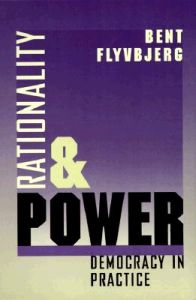Reception
Upon publication, the International Journal of Urban and Regional Research called Rationality and Power "a notable addition to the literature," the reviewer adding, "I cannot think of a better account of how power relations are embodied in local governance." [3]
The Times Literary Supplement wrote: "the monumental tedium of its narrative, its picayune Legoland quality, is the book's great strength. This serves Flyvbjerg's argumentative purposes admirably ... Flyvbjerg's genius lies in his unfailing eye for banality, and for discerning the none too invisible hand of power behind it ... Town planning is the continuation of war by other means. For Flyvbjerg, what is real is not rational, but rationalization ... a world without power is a world without politics. We don't live there. The importance of Flyvbjerg's book is that it acknowledges this fact." [4]
The Australian called the book "the sharpest advance in our understanding of how power actually works since Machiavelli's The Prince was published in 1532." [5]
Little Rock's Arkansas Democrat-Gazette wrote: "In Rationality and Power: Democracy in Practice, Bent Flyvbjerg employs a wide-ranging intellect, an enthusiastic and persuasive voice, academic rigor and great discipline to distill years of research into an outstanding and accessible 250-page civics lesson. It begs for a readership outside academic and professional circles ... Flyvbjerg punctuates his narrative with a wonderfully dry sense of the ironic and the absurd. He can be quietly devastating – even subtly prosecutorial – in exposing ... self-interest and hypocrisy ... Rationality and Power's value is undeniable as a handbook and forensic tool for anyone seeking a better understanding of and access to the democratic process."
Stewart Clegg commented that the book "exemplifies in many ways what is distinctive about Flyvbjerg’s work, as densely textured, ethnographically detailed, and theoretically acute". [6]
This page is based on this
Wikipedia article Text is available under the
CC BY-SA 4.0 license; additional terms may apply.
Images, videos and audio are available under their respective licenses.
